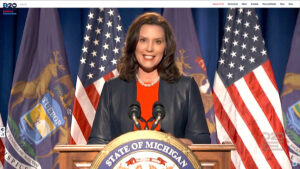(Photo by Handout/DNCC via Getty Images)
Six Michigan men were arrested by federal officials today and charged with conspiring to kidnap and kill Governor Gretchen Whitmer. Multiple informants and undercover agents recorded the alleged plotters surveilling the governor’s vacation home, assembling explosive devices, and plotting to take her to a secure location in Wisconsin to put her on “trial” for “treason.”
Or perhaps not.
“Have one person go to her house. Knock on the door and when she answers it just cap her . . . at this point. Fuck it,” Adam Fox, the alleged leader of the group, said.
We were given to understand that it was Antifa BLM anarchist supersoldiers who were the real danger to democracy. But apparently it’s a bunch of crazed militia dudes in northern Michigan plotting to overthrow the government.
“In all honesty right now . . . I just wanna make the world glow, dude. I’m not even fuckin’ kidding. I just wanna make it all glow dude,” Fox said. “I don’t fuckin’ care anymore, I’m just so sick of it. That’s what it’s gonna take for us to take it back, we’re just gonna have to everything’s gonna have to be annihilated man. We’re gonna topple it all, dude. It’s what great frickin’ conquerors, man, we’re just gonna conquer every fuckin’ thing man.”
Fox is alleged to be a member of the Three Percenters, a rightwing militia network which fancies itself America’s patriotic guardians.
In addition to federal charges by the U.S. Attorney’s Office for the Western District of Michigan, Michigan State Attorney General Dana Nessel promises further charges under Michigan’s anti-terrorism act.
The complaint barely mentions the link between the militia activity and the covid lockdown measures Whitmer imposed in the spring — much less the president’s incendiary agitation against it — but the timing is very clear.
Whitmer (aka “this tyrant bitch”) issued the first lockdown order on March 10, around the same time that Fox and alleged co-conspirator Barry Croft came under FBI surveillance because the agency” became aware through social media that a group of individuals were discussing the violent overthrow of certain government and law-enforcement components.”
In April, Trump encouraged his followers to “liberate” their states from tyrannical public health edicts.
And on June 6, anti-government radicals from several states met in Ohio to discuss creating “a society that followed the U.S. Bill of Rights and where they could be self-sufficient.”
At one point, several members talked about state governments they believed were violating the U.S. Constitution, including the government of Michigan and Governor Gretchen Whitmer. Several members talked about murdering “tyrants” or “taking” a sitting governor. The group decided they needed to increase their numbers and encouraged each other to talk to their neighbors and spread their message. As part of that recruitment effort, FOX reached out to a Michigan based militia group (the “militia group.”)
Throughout the summer, the group attempted to mobilize “200 men” to storm the State Capitol building in Lansing. But, having failed to reach their numbers, the group turned its attention instead to locating Governor Whitmer’s vacation home, where they planned to kidnap her.
“Snatch and grab, man. Grab the fuckin’ Governor. Just grab the bitch. Because at that point, we do that, dude — it’s over,” Fox said on July 27.
The plotters purchased a taser, built explosive devices, discussed sending mail bombs to the governor, and planned to blow up a bridge to delay a police response to the scene.
“If the ???? go????, it also ❌ the ????,” wrote Ty Garbin, another co-conspirator.
Which is funny, because these goobs were under FBI surveillance from the jump, with multiple undercover officers and informants in their ranks recording every interaction.
But it’s also not funny at all, because the Justice Department is publicly warning about the dangers from groups of racial justice protestors, while heavily armed militias are plotting to literally overthrow the government.
Criminal Complaint [US v. Fox, Case 1:20-mj-00416-SJB (W. D. MI, October 6, 20200]
Elizabeth Dye lives in Baltimore where she writes about law and politics.
 Staci Zaretsky is a senior editor at Above the Law, where she’s worked since 2011. She’d love to hear from you, so please feel free to email her with any tips, questions, comments, or critiques. You can follow her on Twitter or connect with her on LinkedIn.
Staci Zaretsky is a senior editor at Above the Law, where she’s worked since 2011. She’d love to hear from you, so please feel free to email her with any tips, questions, comments, or critiques. You can follow her on Twitter or connect with her on LinkedIn.






 Kathryn Rubino is a Senior Editor at Above the Law, and host of
Kathryn Rubino is a Senior Editor at Above the Law, and host of 









 April Kelso is a graduate of the University of Tulsa College of Law. April joined Pierce Couch Hendrickson Baysinger and Green in 2017. She is a girl mom two times over and loves adventuring with her husband and daughters. When not working, she can be found baking, covering something in glitter, playing another round of Uno with her six-year-old, or volunteering at her church. You can email her at
April Kelso is a graduate of the University of Tulsa College of Law. April joined Pierce Couch Hendrickson Baysinger and Green in 2017. She is a girl mom two times over and loves adventuring with her husband and daughters. When not working, she can be found baking, covering something in glitter, playing another round of Uno with her six-year-old, or volunteering at her church. You can email her at